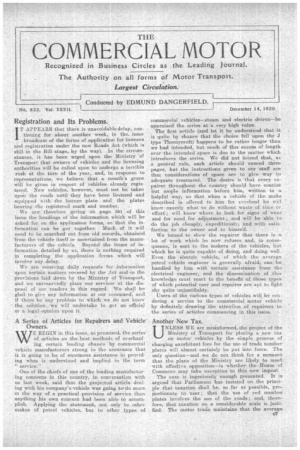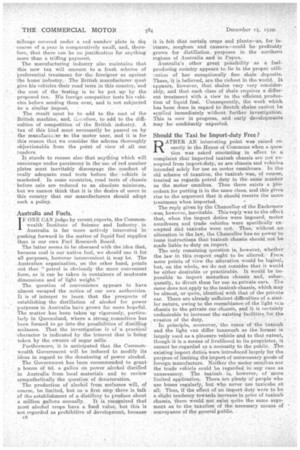Registration and Its Problems.
Page 1

Page 2

If you've noticed an error in this article please click here to report it so we can fix it.
IT APPEARS that there is unavoidable delay, continning for about another week, in the. issue broadcast of the forms of application for licences and-registration under the new Roads .Act (which is still in the Bill stage, by the way). In the circumstances, it has been urged upon the Ministry of Transport that owners of vehicles a-nd the licensing authorities will be called upon to undergo a, terrible .rush at the -turn of the year, and, in response to representationa, we believe that a month's grace will be given in respect of vehicles already registered. New vehicles, however, must not be taken upon the roads until they have been licensed and
./ equipped with the licence plate and the plates bearing the registered mark and number.
We are therefore giving on page 591 of this issue the headings of . the information which will be asked for on the application forms, -so that the information can be got together. Much of it will need to he searched out from old records,obtained from the vehicle itself or ascertained from the manufacturers of the vehicle. Beyend the items of information detailed by us, there is nothing required in completing the application forms which will involve any delay.
We are receiving daily requests for information upon certain matters covered by the Act and -in the provisions laid down by the Ministry of Transport., and we unreservedly place our services at the disposal of our readers in this regard. We shall be glad to give any information at our command, and if there be -any problem to which we do not know the solution, we will undertake to get an official or a legal opinion upon it.
A Series of Articles for. Repairers and Vehicle' Owners.
WE BEGIN in this issue, as promised, the series of articles on the best methods of overhauling certain leading chassis by commercial vehicle manufacturers strong inthe assurance that it is going to be of enormous as' sistanee in providing what is understood and implied in the term " service."
. One of the chiefs of one of the leading manufacturing concerns in this country, in conversation with us last week, said that the projected article dealing with his company's vehicle was going to-do more in the way of a practical provision of service than anything his own concern had been able to accomplish. Applying the statement., not only to .other makes of petrol vehicles, but to other 'types of
commercial vehicles—steam and electric driven--he appraised the series at a very high value.
The first article (and let it be understood that it is quite by chance that the choice fell upon the J type Tharnycroft) happens-to he rather longer than we had intended, but much of this excess of length over the intended space is due to the matter which introduces the series. We did not intend that, as a general rule, each article should exceed three pages, but the instructions given to MIT staff are that. considerations of space are to give way to adequate treatment. The desire is that every repairer throughout,. the country should have concise but ample information before hint, written in a helpful way, so that when a vehicle of the make described is offered to him for overhaul he will know exactly what to do without waste of time or • effort; will know where to look for signs of wear and for need for adjustment ; and will be able to do the job cheaply, expeditiously, and with satis. faction to the owner and to himself.
We intend to show the repairer that there is a lot of work which he new refuses and, in consequence, is sent to the Makers of the vehicles, but which he is quite capable of doing, and doing well. Even the electaic vehicle, of which the average petrol vehicle engineer is generally afraid, can be handled by him with certain assistance from the electrical engineer, and the dissemination of this knowledge must react to the benefit of those types of which potential user and repairer are. apt to fight
shy quite unjustifiably. . Users of the various types of vehicles will be rendering a service to the commercial motor vehicle by definitely drawing the attention of repairers to the series of articles commencing in this issue.
Another New Tax.
UNLESS WE are misinformed, the project. of the Ministry of Transport for placing a new tax on motor vehicles by the simple process of charging exorbitant fees for the use of trade number plates will -almost certainly be put into force. The only question—and we do not think for a moment that the plans of the Ministry are liliely to meet with effective opposition—is whether the House of Commons may take exception to thisnew impost. •
The case is ingeniously enough presented. It is argued that Parliament has insisted on the principle that taxation shall be, so far as possible, proportionate to user ; that the use of red number plates involves the use of the roads ; and, therefore, that taxation on a considerable scale is justified. The motor trade maintains that the average
mileage covered under a red number plate in the course of a year is comparatively small, and, therefore, that there can be DO justification for anything more than a trifling payment.
The manufacturing industry also maintains that this new tax will amount to a .fresh scheme of Preferential treatment -for the foreigner as against the home industry. The British manufacturer must give his vehicles their road tests in this country, and the cost of the testing is to' be put up by the proposed tax. His foreign competitor tests his vehicles before sending them -over, and is not subjected to a similar impost.
The result must be to add to. the cost of the British machine; and, Veerefore, to add to the difficulties of competition of the British industry. A tax of this kind must necessarily be passed on by the manufactueer to the motor user, a-nd it is for this reason that we consider the schema thoroughly objectionable from the point of view ofall our leaders.
It stands to reason also that anything which will encourage undue parsimony in the use of red number plates must inevitably discourage the conduct of really adequate road tests before the vehicle is marketed. In some countries, road tests of chassis before sale are reduced to an absolute minimum, but we cannot think that it is the desire of users in this country that our manufacturers should adopt such a polity. •
Australia and Fuels.
IE ONE CAN judge by recent reports, the Commonwealth Institute of Science and Industry in Australia is far more actively interested in pushing forward in the matter of liquid fuel supplies than is our own Fuel Research Board.
The latter seems tO be obsessed with the idea that, because coal is our native fuel, we should use it for all purposes, however inconvenient it may be. The Australian organization, on the other hand, points out that " petrol is obviously the more convenient form, as it can be taken in containers of moderate dimensions and of light weight."
The question of convenience appears to have almost escaped the notice of our own authorities. It is of interest to learn that the prospects of establishing the distillation of alcohol for power 'purposes in Australia have grown far more hopeful. The matter has been taken up vigorously, particularly in Queensland, where a strong committee has been formed to go into the possibilities of distilling molasses. That the investigation is of a practical -character is indicated by the interest that is Being taken by the owners of sugar mills.
Furthermore, it is anticipated that the Commonwealth Government will be induced to modify it ideas in regard to the denaturing of power alcohol. The Government has been recommended to grant a bonus of 6d. a gallon on power alcohol distilled in Australia from local materials and to review sympathetically the question of denaturation.
The production of alcohol from molasses will, of course, be limited, but as a first step there is talk of the establishment of a distillery to produce about a million gallons annually. It is recognized that most alcohol crops have a food value, but this is not regarded as prohibitive of development, because c8 it is felt that certain crops and plants,--as, for instance, .sorghum and cassava—could be profitably grown for distillation purposes in the n.ortherri regions of Australia and in Papua.
Australia's , other great pasibility as a fuelproducing country appears to lie in the proper utilieation of her exceptionally fine shale deposits. These, it is believed, are the richest in the world. It -appears, however, that shales vary very considerably, and that each class of shale requires a different treatment with a view to the efficient production of liquid fuel. Consequently, the work which has been done in regard to Scotch shales cannot be applied immediately without further investigation. This is now in progress, and early -developments may be confidently expected.
Should the Taxi be Import-duty Free ?
RATHER AN interesting point was raised recently in the House of Commons when a question was asked amoimting in effect to a complaint that imported taxicab chassis are not exempted from import-duty, as are chassis and vehicles intended solely for use as motor omnibuses. In the old scheme of taxation, the taxicab was, of course, treated as regards petrol duty in the same manner as the motor omnibus. Thus there exists a peecedent for putting it in the same class, and this gives rise to the argument that it should receive the same treatment when imported.
• The reply given by the Chancellor of the Exchequer -NM% however, inevitable. This imply was to the effect that, when the import duties were imposed, motor omnibuses and trade vehicles were specifically exempted and taxicabs were not. Thus, without an alteration in the law, the Chancellor has no power to issue instructions that taxicab chassis should not be made liable to duty on import. The only remaining question is, howeveir, whether the law in this respect ought to be altered. From some points of view the alteration would be logical,hut, on the whole, we do not consider that it would be either desirable or practicable. It would he impossible to import motorbus chassis and, subsequently, to divert them for use as private cars. The same does not apply to the taxicab chassis, which may be almost, or quite, identical with that of the private car. There are already sufficient difficulties of a similar nature, owing to the resemblance of the light vanchassis to the private car chassis, and it is certainly undesirable to increase the existing facilities for the evasion of the duty. • In principle, moreover, the cases of the taxicab and the light van differ inasmuch as the former is largely used as a pleasure vehicle and to that extent, though it is a means of livelihood to its proprietor, it cannot be regarded as a necessity to the public. The existing import duties were introduced largely for the purpose of limiting the import of unnecessary goods of foreign manufacture. Neither the motor omnibus nor the trade vehicle could be regarded in any case as unnecessary. The taxicab is, however, of more limited application. There are plenty of people who use buses regularly, but who never use taxicabs at all. Thus, if the effect of an import duty were to be a slight tendency towards increasei in price of taxicab chassis, there would not exist quite the same argument as to the taxation of the necessary means of conveyance of the general public.






























